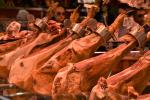H2020 SIMBA Project: Sustainable innovation of microbiome applications in the food system.
- Type Project
- Status Filled
- Execution 2018 -2023
- Assigned Budget 9.999.999,77 €
- Scope Europeo
- Main source of financing Horizon 2020
- Project website SIMBA
Given the continued increase in the world's population, equitable food supply has become a major issue and a future challenge. Microbes are an untapped tool for increasing food productivity and quality.
The objective of the SIMBA project is to harness complex soil and marine microbial communities (microbiomes) for sustainable food production. SIMBA will focus on two interconnected food chains: agricultural production and aquaculture. SIMBA will first initiate an in silico phase to analyze pre-existing microbiome databases and previous studies, in order to identify the optimal microbial arrangement capable of supporting food chain quality and productivity. Microbiome-specific interventions, including soil, plant, fish, aquaculture, and food/feed processing, will be developed to achieve an optimal arrangement, as defined in the modeling stage, as follows: i) The identified optimal microbiome consortia will be designed and tested in laboratory, pot, and field trials to improve plant productivity and health; ii) Marine microbiomes will be applied to facilitate sustainable aquaculture and agriculture. iii) Optimal microbial consortia will be used to convert raw materials and waste into high-quality food, feed or, ultimately, energy.
In a final phase of the intervention, these interactions will be monitored and tested in field studies, aquaculture, fish feed, and humans, measuring the impact on microbial consortia and the interactions in association with factors that assess their effectiveness in terms of improving food safety, productivity, quality, safety, sustainability, nutrition, and health. "Near-to-market" microbial applications for sustainable food systems will be provided thanks to the interdisciplinary and transversal nature of the proposal and the active role of small and medium-sized enterprises (SMEs).
As the global population continues to increase, ensuring an equally accessible food supply has become a major issue and a future challenge. Microbes are an untapped tool for increasing food productivity and quality. The goal of the SIMBA project is to harness complex marine and soil microbial communities (microbiomes) for sustainable food production. SIMBA will focus on two interconnected food chains: agricultural production and aquaculture. SIMBA will first launch an in silico phase to analyze other pre-existing microbiome databases and previous studies to identify the best microbiome design capable of supporting food chain quality and productivity.
Microbiome-tailored interventions will be specifically developed that include soils, plants, fish, aquaculture, and food/feed processing to achieve an optimal design, as defined in the modeling step, as follows:
- The identified optimal microbiome consortia will be designed and tested in laboratory, pot, and field trials to improve plant productivity and health.
- Marine microbiomes will be applied to facilitate sustainable agriculture and aquaculture.
- Optimal microbe/microbe consortia will be used to convert raw materials and waste into high-quality food or feed or, ultimately, energy.
In a final intervention step, these interactions will be monitored and tested in field, aquaculture, fish feed, and human studies, measuring their impact on microbiome consortia, as well as in association with factors that assess their effectiveness in improving food safety, productivity, quality, security, sustainability, and nutritional and health aspects. "Near-market" microbiome applications for sustainable food systems will be provided thanks to the interdisciplinary and transversal nature of the proposal and the active role of small and medium-sized enterprises (SMEs).
- LUONNONVARAKESKUS (LUKE - NATURAL RESOURCES INSTITUTE FINLAND)






